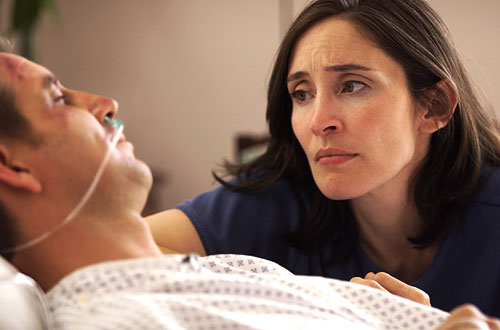
One day after his wedding, construction company program manager Brian O’Keefe attempted a heroic feat – jumping into a parked truck that had begun rolling backward -- that left him near death on a PennStar chopper instead of on a plane to his Dominican Republic honeymoon. The truck ran over him, crushing his ribs, and injuring nearly all his internal organs – severing his liver and creating serious kidney and spleen problems. Under the care of the Penn trauma and surgical critical care team, he spent 17 days at HUP recuperating from his injuries.
Much of O’Keefe’s time in the hospital, back in the summer of 2005, is a blur, but what stands out is that, each time he emerged from unconsciousness, he recalls seeing a family member or a close friend sitting at his bedside. Their constant presence was soothing and reassuring, especially when he wasn’t yet able to understand what was happening to him. Even when he was conscious, O’Keefe felt he usually wasn’t capable of making decisions about his care, and he said the close partnership his family was able to forge with his caregivers was essential to his comfort and safety.
“You kind of come out of your morphine sleep sometimes, and there’s days where you just wake up and are kind of like, ‘Where am I?’” O’Keefe says. “It was always refreshing to have that familiar face when you’re going through so much while you’re laying there. Having that person there when you need them helps turn a negative into a positive.”
As illustrated by cases like O’Keefe’s, HUP’s staff has long been committed to helping keep patients and their families together. Now, however, the Joint Commission and the Centers for Medicare and Medicaid Services formally call for hospitals to make provisions for each patient, if they choose, to be accompanied any point during their stay by a family member, friend or other support person. As part of HUP’s Patient- and Family-Centered Care Initiative, leaders have rolled out new ways to accommodate visitors and help them support their loved ones during these often scary, stressful times.
Although staff may limit bedside visitation for a clinical or safety reason, staff members work closely with patients upon admission to ask patients to identify their designated “support person” and discuss how they would like them to be involved in their care and decision-making. To accommodate overnight visitation, the hospital has brought in more sleep chairs so families can stay close to the bedside, and plans are underway to expand traditional visiting hours. A pilot program in several oncology units provides a blue wrist band to each patient’s support person to help identify them and their important role.
Though not every family comes to us at such a pivotal time in their lives as O’Keefe did, we’re working to keep family ties strong whenever patients here are hospitalized. If you’ve been hospitalized – or cared for a family member or close friend during a hospitalization – we’d like to hear your tips on how to support your loved one and partner with doctors and nurses.
As for Brian O’Keefe, he and his wife did eventually get that honeymoon they missed – they spent 10 days in Hawaii a year after his accident, and today, they have a son who’s almost two years old.